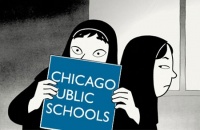
Faced with a student protest and an Internet-fueled censorship uproar over an order to remove all copies of Marjane Satrapi’s graphic novel Persepolis from Chicago Public schools (see "Chicago High Schools Banning Persepolis?"), CPS chief Barbara Byrd-Bennett has requested that all principals in the system disregard the order to pull the book, but at the same time Byrd-Bennett told schools in the Chicago system to refrain from teaching the book in 7th Grade classes "due to its powerful images of torture."
The Chicago Tribune reports that Byrd-Bennett acted to quickly to attempt to quash the controversy, but her attempt to spin the story as simply a mistake in an "unvetted document" that was only supposed to prohibit its teaching to 7th graders appears to be flimsier than a tissue-paper tank. Satrapi’s autobiographical coming-of-age saga has previously only been banned in Iran, and as a spokesperson for the Chicago Teachers Union told the Tribune, "I read the book. It’s about a little girl growing up during the Iranian revolution. She starts questioning and thinking... It’s a great book for young girls, it teaches you to think for yourself."
The Chicago Public School District released the image of a page from the book that depicted a whipping, a man being branded with a hot iron, and urinated on. While the images are powerful, they are not nearly as grisly as the clinical gore broadcast in early prime time weekly on the bevy of forensic-themed police procedurals like Bones and the CSI series.
Persepolis author Marjane Satrapi isn’t buying the torture excuse. The Tribune quotes the writer’s skeptical assessment of the CPS excuse: "These are not photos of torture. It’s a drawing and it’s one panel. I don’t think that American seventh graders have never seen any signs of violence. Seventh graders have brains and they see all sorts of things in movies and on the Internet. It’s a black and white drawing and I’m not showing something extremely horrible. That’s a false argument. They have to give a better explanation."


